[学前教育有关英语的论文]学前教育方面的小论文
幼儿学前英语教育论文
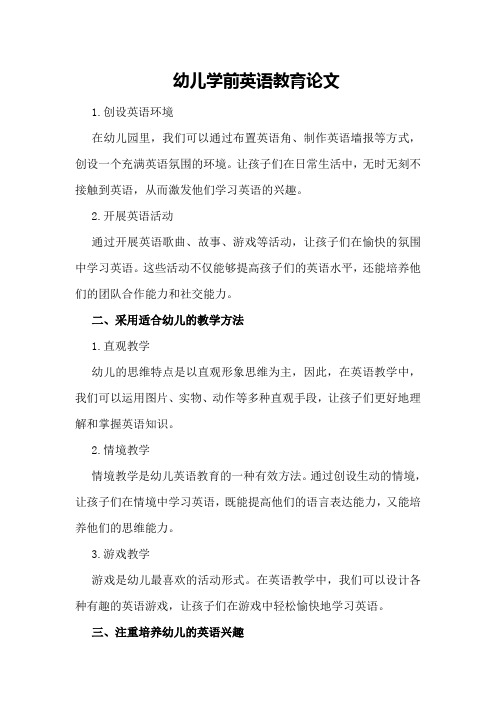
幼儿学前英语教育论文1.创设英语环境在幼儿园里,我们可以通过布置英语角、制作英语墙报等方式,创设一个充满英语氛围的环境。
让孩子们在日常生活中,无时无刻不接触到英语,从而激发他们学习英语的兴趣。
2.开展英语活动通过开展英语歌曲、故事、游戏等活动,让孩子们在愉快的氛围中学习英语。
这些活动不仅能够提高孩子们的英语水平,还能培养他们的团队合作能力和社交能力。
二、采用适合幼儿的教学方法1.直观教学幼儿的思维特点是以直观形象思维为主,因此,在英语教学中,我们可以运用图片、实物、动作等多种直观手段,让孩子们更好地理解和掌握英语知识。
2.情境教学情境教学是幼儿英语教育的一种有效方法。
通过创设生动的情境,让孩子们在情境中学习英语,既能提高他们的语言表达能力,又能培养他们的思维能力。
3.游戏教学游戏是幼儿最喜欢的活动形式。
在英语教学中,我们可以设计各种有趣的英语游戏,让孩子们在游戏中轻松愉快地学习英语。
三、注重培养幼儿的英语兴趣1.激发好奇心好奇心是幼儿学习的内在动力。
在英语教学中,我们要善于激发孩子们的好奇心,让他们对英语产生浓厚的兴趣。
2.设置小目标在英语学习过程中,我们要根据孩子们的实际情况,为他们设置合适的小目标。
当孩子们达成目标时,要及时给予表扬和鼓励,让他们感受到成功的喜悦。
3.注重情感交流四、家庭与幼儿园的互动1.加强家长沟通2.开展亲子活动通过开展亲子英语活动,让家长参与到孩子的英语学习中来,既能增进亲子关系,又能提高孩子的英语水平。
幼儿学前英语教育是一项重要的工作。
我们要根据幼儿的年龄特点和认知规律,采用适合他们的教学方法,激发他们的英语兴趣,为他们的未来发展打下坚实的基础。
幼儿学前英语教育论文在幼儿园的小天地里,英语教育的春风早已悄然吹拂。
作为一名经验丰富的幼儿教育工作者,我发现,孩子们对于英语的兴趣和敏感度超乎我们的想象。
他们如同小小的海绵,渴望吸收各种知识,尤其是语言的学习。
下面我就来聊聊我对幼儿学前英语教育的一些心得体会。
和学前教育有关的英语作文
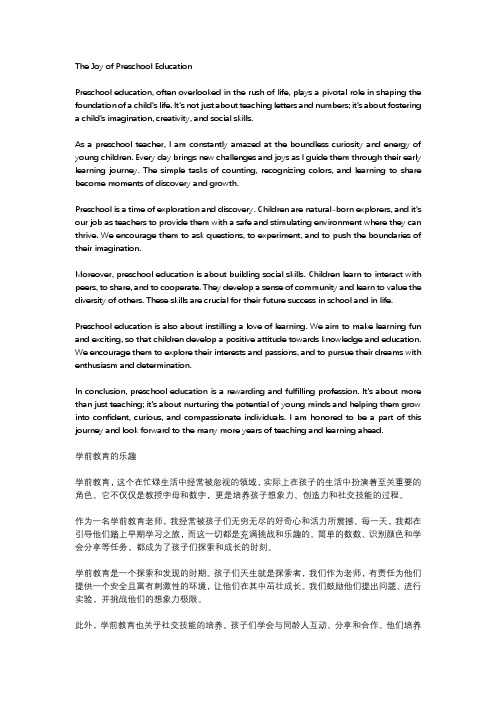
The Joy of Preschool EducationPreschool education, often overlooked in the rush of life, plays a pivotal role in shaping the foundation of a child's life. It's not just about teaching letters and numbers; it's about fostering a child's imagination, creativity, and social skills.As a preschool teacher, I am constantly amazed at the boundless curiosity and energy of young children. Every day brings new challenges and joys as I guide them through their early learning journey. The simple tasks of counting, recognizing colors, and learning to share become moments of discovery and growth.Preschool is a time of exploration and discovery. Children are natural-born explorers, and it's our job as teachers to provide them with a safe and stimulating environment where they can thrive. We encourage them to ask questions, to experiment, and to push the boundaries of their imagination.Moreover, preschool education is about building social skills. Children learn to interact with peers, to share, and to cooperate. They develop a sense of community and learn to value the diversity of others. These skills are crucial for their future success in school and in life.Preschool education is also about instilling a love of learning. We aim to make learning fun and exciting, so that children develop a positive attitude towards knowledge and education. We encourage them to explore their interests and passions, and to pursue their dreams with enthusiasm and determination.In conclusion, preschool education is a rewarding and fulfilling profession. It's about more than just teaching; it's about nurturing the potential of young minds and helping them grow into confident, curious, and compassionate individuals. I am honored to be a part of this journey and look forward to the many more years of teaching and learning ahead.学前教育的乐趣学前教育,这个在忙碌生活中经常被忽视的领域,实际上在孩子的生活中扮演着至关重要的角色。
重视学前教育的英文作文
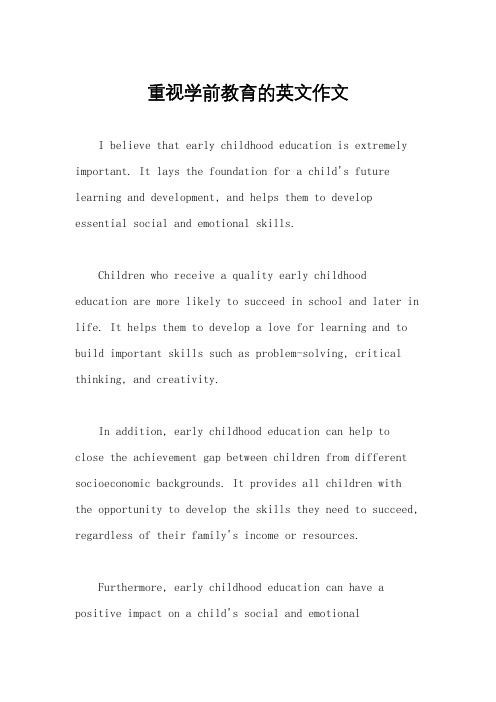
重视学前教育的英文作文I believe that early childhood education is extremely important. It lays the foundation for a child's future learning and development, and helps them to develop essential social and emotional skills.Children who receive a quality early childhood education are more likely to succeed in school and later in life. It helps them to develop a love for learning and to build important skills such as problem-solving, critical thinking, and creativity.In addition, early childhood education can help to close the achievement gap between children from different socioeconomic backgrounds. It provides all children with the opportunity to develop the skills they need to succeed, regardless of their family's income or resources.Furthermore, early childhood education can have a positive impact on a child's social and emotionaldevelopment. It helps them to build strong relationships with their peers, develop empathy and compassion, and learn how to regulate their emotions.Overall, I believe that investing in early childhood education is one of the best ways to ensure a bright future for our children and our society as a whole. It is acrucial step in building a strong foundation for lifelong learning and success.。
学前教育专业幼儿英语教学研究论文
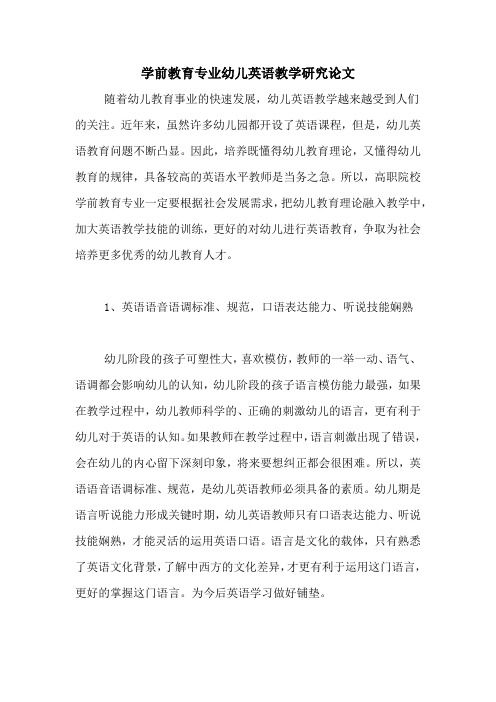
学前教育专业幼儿英语教学研究论文随着幼儿教育事业的快速发展,幼儿英语教学越来越受到人们的关注。
近年来,虽然许多幼儿园都开设了英语课程,但是,幼儿英语教育问题不断凸显。
因此,培养既懂得幼儿教育理论,又懂得幼儿教育的规律,具备较高的英语水平教师是当务之急。
所以,高职院校学前教育专业一定要根据社会发展需求,把幼儿教育理论融入教学中,加大英语教学技能的训练,更好的对幼儿进行英语教育,争取为社会培养更多优秀的幼儿教育人才。
1、英语语音语调标准、规范,口语表达能力、听说技能娴熟幼儿阶段的孩子可塑性大,喜欢模仿,教师的一举一动、语气、语调都会影响幼儿的认知,幼儿阶段的孩子语言模仿能力最强,如果在教学过程中,幼儿教师科学的、正确的刺激幼儿的语言,更有利于幼儿对于英语的认知。
如果教师在教学过程中,语言刺激出现了错误,会在幼儿的内心留下深刻印象,将来要想纠正都会很困难。
所以,英语语音语调标准、规范,是幼儿英语教师必须具备的素质。
幼儿期是语言听说能力形成关键时期,幼儿英语教师只有口语表达能力、听说技能娴熟,才能灵活的运用英语口语。
语言是文化的载体,只有熟悉了英语文化背景,了解中西方的文化差异,才更有利于运用这门语言,更好的掌握这门语言。
为今后英语学习做好铺垫。
2、学前教育基本技能娴熟,学前专业理论知识过硬作为幼儿第二语言的启蒙教育,幼儿英语教育不仅要培养幼儿良好的英语学习习惯,还要在教学过程中,激发幼儿学习英语的兴趣,促进幼儿英语语言的敏感性,为幼儿将来学好英语奠定基础。
因此,幼儿英语教师不仅要英语语音语调标准、规范,口语表达能力、听说技能娴熟,还要学前教育基本技能娴熟,学前专业理论知识过硬。
幼儿的身心发展规律特殊,所以,在教学过程中,教师首先必须了解幼儿的身心发展特点,同时,掌握学前教育的理论知识。
尤其是学前心理学、学前教育学等理论知识必须娴熟。
只有掌握了专业理论知识,了解幼儿的身心发展特点,才能根据幼儿认知规律、身心发展规律制订相应的,同时,根据学生的年龄特征、兴趣爱好,选择适合孩子的教育策略,激发幼儿的英语学习兴趣,提高幼儿英语的教育质量。
关于学前教育专业的英语作文

The Importance of Preschool Education: Shaping the Future GenerationPreschool education, often overlooked in the race for academic excellence, plays a pivotal role in the cognitive, emotional, and social development of young children. It is during this critical phase that children's brains are like sponges, absorbing information and experiences that will shape their future. Preschool education not only prepares children academically but also equips them with the necessary skills and attributes for life-long learning and success.The academic benefits of preschool education are numerous. Children who attend preschool are more likely to have a higher IQ, better language skills, and a stronger foundation in math and science. Preschool provides a structured environment where children learn through play, which stimulates their imagination and creativity. Thistype of learning is not only fun but also effective in engaging children's minds and fostering a love for learning. Moreover, preschool education is essential for social and emotional development. Preschool is a microcosm ofsociety, where children learn to interact with peers, share, negotiate, and resolve conflicts. They also learn toregulate their emotions and develop a sense of empathy and compassion. These skills are crucial for children's success in school and later in life.Additionally, preschool education instills values and ethics that are vital for character development. Children learn to respect others, follow rules, and takeresponsibility for their actions. They also learn toproblem-solve and make informed decisions. These values and ethics form the foundation of a child's moral compass, guiding them through life's challenges and decisions.However, the benefits of preschool education extend beyond the classroom. Preschool teachers serve as role models, providing children with positive examples of behavior and attitude. They encourage children to explore, take risks, and persevere in the face of challenges. This encouragement fosters a growth mindset, where childrenlearn that failure is not permanent and that with hard work and perseverance, they can achieve anything.In conclusion, preschool education is not just about teaching children letters and numbers; it's about shaping the future generation. It prepares children academically, socially, emotionally, and morally, giving them the tools and skills they need to succeed in school and in life. As we invest in preschool education, we invest in the future of our society, ensuring that the next generation is well-prepared, well-rounded, and ready to take on the world. **学前教育的重要性:塑造未来的一代**在追求学术卓越的竞赛中,学前教育往往被忽视,但它在儿童的认知、情感和社会发展中起着至关重要的作用。
关于学前教育专业的英语作文

关于学前教育专业的英语作文**The Importance of Preschool Education and Its Impact on Children's Development**Preschool education, an integral part of a child's early development, plays a pivotal role in shaping their cognitive, emotional, and social skills. This crucial phase of education, often overlooked, holds immense potential for laying a solid foundation for future learning and success. The cognitive development of children during preschool years is remarkable. This is a time when their brains are actively developing neural connections, making them sponge-like in absorbing new information. Through variousactivities such as storytelling, singing, and hands-on experiments, preschool education stimulates children's curiosity and imagination, encouraging them to explore and understand the world around them.Moreover, preschool education fosters emotional and social skills in children. In a preschool setting, children learn to interact with peers, share, and cooperate, which are essential skills for later life. They also learn toexpress their feelings and understand the emotions of others, fostering empathy and compassion.The impact of preschool education is not limited to the immediate present but extends to the long-term future of children. Children who receive quality preschool education are more likely to excel in academic settings later on, demonstrating better literacy and numeracy skills. They also tend to have higher self-esteem and confidence, which are critical for success in school and beyond.However, it is important to note that not all preschool education is created equal. The quality of preschool education varies widely, and it is crucial to choose a program that meets the individual needs and interests of each child. Factors such as teacher qualifications, curriculum content, and class size can significantly influence the effectiveness of preschool education.In conclusion, preschool education is a vital component of a child's early development, shaping their cognitive, emotional, and social skills. Its impact extends far beyond the preschool years, influencing children's academic and personal success throughout their lives. It is, therefore,essential for parents and educators to prioritize preschool education and ensure that children receive quality early learning experiences.**学前教育的重要性及其对儿童发展的影响**学前教育作为儿童早期发展的一个重要组成部分,在塑造儿童认知、情感和社交技能方面起着关键作用。
学前教育双语教育论文(通用6篇)

学前教育双语教育论文学前教育双语教育论文(通用6篇)学前教育是就业率排名最高的专业之一,几乎是供不应求,很多幼儿园都需要提前下“定单”。
大家不妨来看看小编推送的学前教育双语教育论文,希望给大家带来帮助!学前教育双语教育论文篇1新疆是少数民族聚居区,长期世居于这片沃土上的有13个民族,为推动区域文化的积极发展,教育要先行,高校教育所肩负的责任就更加重要了。
双语学前教育教学是近几年新疆文化战略部署中的重要举措,是推动新疆少数民族文化的积极措施,舞蹈作为学前教育专业中的专业必修课程,在实际教学过程中他是不同于普通学前教育专业的舞蹈课程,它的内容设置、教学思路、教学方法都是有待探讨的。
一、双语学前教育的舞蹈教学现状1、概念界定双语学前教育:本文双语学前教育主要是针对少数民族地区的学生在学习的过程中掌握汉语或汉族学生在学习的过程中掌握少数民族语言。
学前教育专业舞蹈教学:学前教育专业的舞蹈教学是在教学内容的设计与安排上与专业班舞蹈教学内容有所不同,她主要是让学生掌握各民族舞蹈动态元素之后,并会结合儿童动态元素进行儿童舞蹈的表演与编排,对元素的化简及熟练运用相结合,更注重学生舞蹈综合能力的培养。
2、双语学前教育专业的舞蹈教学现状分析学前教育专业的舞蹈教学在经过课程改革后,舞蹈教学课时由原来四年的教学课时量减为两年完成,教学时数减少后教学内容随之也发生较大的变化,很多内容因此删去,如汉族民间舞蹈包括:陕北秧歌、东北秧歌、云南花灯、安徽花鼓灯、胶州秧歌五大类,在实际的教学过程中只能有选择地选择1至2种进行教学。
在实践教学的过程中,为了完成教学计划,对学生进行由理论到实践的环节明显减少了。
教师在教学过程中要让学生学会一个民族的舞蹈动态元素的过程中,要快速地简单讲解该动态元素的基本特征及该动态元素在学习的过程中应如何更准确的掌握,其重点是在动作的教授过程中,而对该民族的地域、文化、民俗部分的讲解,该环节在教学过程中往往被教师们所忽略。
学前教育毕业论文范文(4篇)
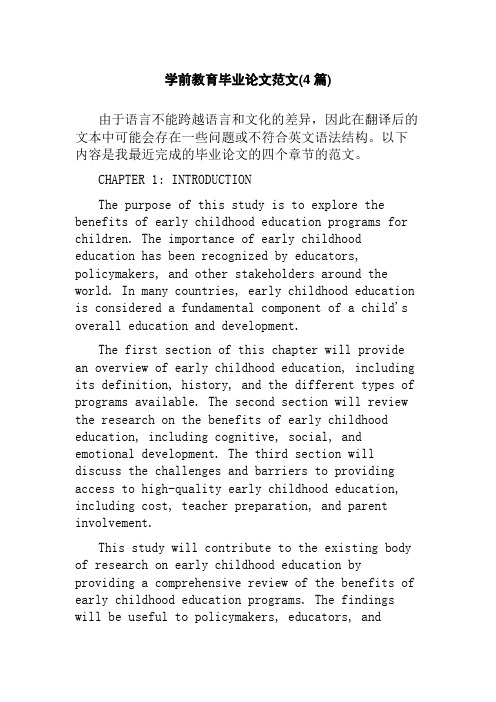
学前教育毕业论文范文(4篇)由于语言不能跨越语言和文化的差异,因此在翻译后的文本中可能会存在一些问题或不符合英文语法结构。
以下内容是我最近完成的毕业论文的四个章节的范文。
CHAPTER 1: INTRODUCTIONThe purpose of this study is to explore the benefits of early childhood education programs for children. The importance of early childhood education has been recognized by educators, policymakers, and other stakeholders around the world. In many countries, early childhood education is considered a fundamental component of a child's overall education and development.The first section of this chapter will provide an overview of early childhood education, including its definition, history, and the different types of programs available. The second section will review the research on the benefits of early childhood education, including cognitive, social, and emotional development. The third section will discuss the challenges and barriers to providing access to high-quality early childhood education, including cost, teacher preparation, and parent involvement.This study will contribute to the existing body of research on early childhood education by providing a comprehensive review of the benefits of early childhood education programs. The findings will be useful to policymakers, educators, andparents who are interested in supporting early childhood education.CHAPTER 2: LITERATURE REVIEWThis chapter will provide a review of the research on the benefits of early childhood education programs. It will begin with an overview of the research on the cognitive benefits of early childhood education and then move on to the research on the social and emotional benefits.The cognitive benefits of early childhood education are well-documented. Research has shown that children who attend high-quality early childhood education programs perform better ontests of cognitive ability, language development, and academic achievement than children who do not attend such programs. These benefits areparticularly pronounced for children from low-income families and those who are at risk of academic failure.The social and emotional benefits of early childhood education are equally important. Research has shown that children who attend high-quality early childhood education programs are more likely to develop positive social skills, such as cooperation, sharing, and empathy. They are also less likely to exhibit behavior problems, such as aggression and impulsivity.Despite the overwhelming evidence of the benefits of early childhood education, access to high-quality programs remains a challenge. This is particularly true for children from low-incomefamilies and those who live in rural or underserved areas. To address this issue, policymakers and educators must work to increase funding for early childhood education programs and to provide professional development opportunities for early childhood educators.CHAPTER 3: METHODOLOGYThe purpose of this study is to explore the benefits of early childhood education programs for children. The research question for this study is: What are the benefits of early childhood education programs for children's cognitive, social, and emotional development? The research design for this study will be a systematic literature review.The inclusion criteria for this study will be peer-reviewed articles published in English between 2000 and 2019 that focus on the benefits of early childhood education programs. The exclusioncriteria will be articles that focus on programsfor older children or adolescents, and articlesthat do not focus on the benefits of early childhood education programs.The search strategy for this study will include searching electronic databases such as ERIC, Education Research Complete, and PsycINFO. The search terms will include \。
- 1、下载文档前请自行甄别文档内容的完整性,平台不提供额外的编辑、内容补充、找答案等附加服务。
- 2、"仅部分预览"的文档,不可在线预览部分如存在完整性等问题,可反馈申请退款(可完整预览的文档不适用该条件!)。
- 3、如文档侵犯您的权益,请联系客服反馈,我们会尽快为您处理(人工客服工作时间:9:00-18:30)。
[学前教育有关英语的论文]学前教育方面的小论文
学前教育有关英语的论文篇一
《学前儿童英语教育方法的研究》
摘要:随着社会生活信息化和经济全球化,英语作为一门国际语言受到全世界人民的重视,也被很多国家作为官方语言使用。
尤其是幼儿英语教育,在当今已成为一个热门话题。
影响幼儿英语学习的三大教育因素是教材、教学方法、教师素质。
教师应当及时更新教育理念,结合现代发展需求和幼儿的身心发展特点,改进教学方法,帮助幼儿学习英语。
文章以游戏兴趣法为例,对幼儿英语教育进行研究以利于幼儿更好地学习英语。
关键词:游戏教学法;幼儿英语教育;教学方法
幼儿英语教育是时代的需求,是社会发展的需要,也是幼儿园发展的需要。
现在英语教学正在逐步走向生动化和生活化,因此,只有活跃课堂气氛,调动学生兴趣才能使英语教学更有实效。
在幼儿英语教育中,教师正确的教学方法是关键。
爱因斯坦说过“兴趣是最好的老师”,教育心理学中也讲过,只有孩子感兴趣的东西才会主动思考。
为了满足幼儿的求知欲,教师要以一种最简洁的方法使幼儿获得必要的知识。
爱玩是孩子的天性,幼儿最感兴趣的就是游戏,在游戏的同时汲取知识,这是一种更容易让幼儿接受的方法,所以游戏兴趣法是幼儿英语教育中重要的方法之一。
在幼儿英语教育中,教师在游戏中不断探究新的形式和方法,是提高幼儿英语水平和培养幼儿英语学习兴趣的重要手段。
学前儿童英语教育是指根据学前儿童身心发展特点和语言学习规律,通过创设适宜的环境对学前儿童进行的英语启蒙教育。
学前儿童的英语启
蒙不同于小学英语教育,它是对学前儿童进行英语方面的早期启蒙,主要
目的是培养他们对英语语音语感的敏感,激发他们对英语学习的兴趣。
一、英语学习方法的创新种类
(一)昂立“0”式英语
昂立“0”式英语是以“英语学习零起点,课堂学习零距离,学生进
步零距离”为原则的教学理念和方法。
在教学上倡导全英文。
这一教学在
方法上强调一对一语言交流,让孩子成为学习英语的主角。
(二)汇点TPR模式
(三)卓越双语言教学法
卓越双语言教学法是指在课堂中,中外教共同教学,由专业中国教师
负责课堂英语知识总结、辅导疑难,由外教负责英语口语及英语课堂教学。
这种方法既创造了良好的英语环境,又能让学生更深刻地理解所学知识。
通过对以上几种具有创新性的英语学习方法的总结,结合园所的实际
情况,在运用游戏兴趣法时可将其进行创新综合,根据幼儿英语教育的启
蒙性,在适宜的难度基础上,创设语言环境,进行英汉双用。
国外的英语
教学理论界特别强调要把激发学生的学习兴趣放在重要位置,要创造轻松
愉快的学习气氛,尽量把枯燥的语言形式转变为学生乐于接受的、生动有
趣的游戏形式。
二、如何使游戏兴趣法得到正确运用
(一)加强幼儿英语教师的培训
当前,幼儿园教师在组织英语教育活动时面临许多困难。
为解决这个
问题,教育研究和管理部门应对幼儿英语教师的上岗资格认证严格把关。
一方面加强教师英语专业知识的日常学习和继续深造,不断更新英语知识;另一方面为教师提供具有针对性的幼儿园英语教学培训。
此外,还应加强
幼儿英语教师在实践教育活动中的灵活性,使教师不仅有较高的专业理论
知识,而且在教学中能将实际与理论相结合,更好地将理论运用于教学。
(二)通过游戏创设良好的语言环境
要给幼儿创造良好的语言环境,必须丰富孩子的生活。
因为生活是语
言的源泉,只有丰富的生活,才能为语言提供良好的环境。
幼儿园要注意
增长幼儿的知识经验,扩展视野,促进思维发展,才能培养孩子良好的语
言表达能力。
在课堂上,通过教师设计的游戏,让幼儿多看,拓宽观察角度;让幼儿多听,培养孩子注意倾听的习惯;让幼儿多说,使他们有话讲、
愿意讲。
在课下,要利用饭后、室外运动等时间有目的地同孩子进行英语
交流,不论说错说对,都要鼓励孩子。
这样幼儿园就形成了一个良好的语
言环境,让幼儿自然而然地习惯于用英语进行日常交流。
(三)游戏设计的目的性及适宜性
游戏教学必须以教学内容为中心,在设计游戏的时候要充分把握课程
的重点、难点,围绕教学目的合理安排设计游戏。
这样才能达到教学目的。
游戏活动设计要符合不同年龄阶段儿童各方面的水平差异。
评判游戏
是否具有高质量、教育性的标准是学生与老师是否进行互动,在互动的过
程中把适当的知识传授给幼儿。
游戏给予幼儿认识世界和发展幼儿符号能
力的机会。
在幼儿英语教学中的设计也要符合这一主线。
学前儿童英语游戏兴趣教学法是根据幼儿身心发展的年龄特征,遵循
幼儿语言学习的基本规律和原则,创建系统的,有丰富内涵的英语学习体系。
通过游戏这一桥梁,激发幼儿兴趣,使幼儿积极主动探究,让幼儿初
步获得英语语感、英语思维及英语意识。
通过游戏兴趣法的教学,让幼儿在轻松、快乐、自由的氛围中学习英语,既有利于幼儿语言交往能力的培养,又为幼儿进入读写阶段的学习打下良好的基础。
